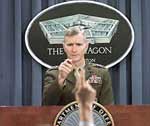 |
US & British Aircraft Attacked Targets Near Baghdadon Friday

US & British Aircraft Attacked Targets Near Baghdadon
US and British aircraft attacked targets near Baghdad on Friday and President George W. Bush said Washington would take "appropriate action" if Iraqi leader Saddam Hussein produced weapons of mass destruction.
US Defense officials said 24 American and British planes struck five Iraqi military targets five to 20 miles (eight to 32 km) from Baghdad using various long-range precision-guided weapons.
Iraqi television broadcast an official statement saying planes had struck targets on the outskirts of Baghdad. The statement was issued after a meeting of Iraqi leaders chaired by Saddam.
"We will fight them in the air, on land and sea and their aggression will achieve nothing but failure," it said. The statement also blamed Kuwait and Saudi Arabia which provide bases for coalition forces in the region.
Iraqi television said the attack was the first Western strike against the capital since December 1998.
At Baghdad's Yarmouk hospital, physician Dr Omar al-Abdali said nine wounded people, some critically hurt, had been admitted.
The US Defense Department said the planes had hit Iraqi air defenses outside the Western-imposed no-fly zone south of Baghdad. A spokesman said no further attacks were expected soon.
President Bush, speaking after he had authorized the strikes, told a news conference during a one-day visit to Mexico that Washington was keeping a close eye on Iraq.
"We're going to watch very carefully as to whether or not he develops weapons of mass destruction, and if we catch him doing so, we'll take the appropriate action," said Bush, whose father George Bush was president during the 1990-91 Gulf War that drove invading Iraqis out of Kuwait.
George W. Bush, who took office on January 20, said the United States would continue to enforce the no-fly zones imposed after the Gulf War to protect a Kurdish enclave in northern Iraq and anti-Baghdad Shi'te Muslims in the south.
The northern edge of the southern zone -- the 33rd parallel -- lies just south of Baghdad.
LOUD EXPLOSIONS HEARD
Sirens wailed over Baghdad, loud explosions were heard and anti-aircraft systems opened fire.
The US Defense Department said the planes struck Iraqi radar systems at about 12:30 p.m. to 1 p.m. EST (1730-1800 GMT).
Bush said the attack was a routine mission but had required the President's personal authorization.
The British Defense Ministry said British and American planes attacked six sites, comprising part of Iraq's integrated Air Defense System.
"This was a proportionate response to a recent increase in the threat to aircraft carrying out legitimate humanitarian patrols in the southern no-fly zone," Defense Secretary Geoff Hoon said in a statement.
A leading hawk in the Russian military, Colonel-General Leonid Ivashov, condemned the air strikes and accused Washington of acting like the world's policeman. Ivashov, head of the military's foreign relations department, was quoted by Itar-Tass news agency as saying this was a dangerous tendency.
Iraqi television showed Health Minister Umeed Madhat Mubarak visiting Yarmouk hospital. Some of the victims shown on television said they were wounded while walking in the al-Mansur area in central Baghdad.
While there have been a number of strikes on targets in the northern and southern no-fly zones, the last time Baghdad came under attack was in December 1998.
The United States and Britain launched a four-day bombing campaign in 1998 to punish Iraq for expelling UN arms inspectors charged with eliminating the country's weapons of mass destruction.

In This Section

|